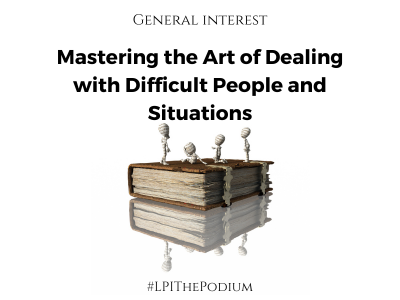
In life, we encounter a wide array of personalities and challenging situations that can test our patience and resilience. Dealing with difficult people or navigating through tough circumstances can be emotionally draining and mentally taxing. However, by adopting the right mindset and applying effective strategies, we can transform these challenging encounters into opportunities for personal growth and enhanced communication. In this blog article, we will explore valuable tips for handling difficult people and situations with grace and understanding.
Stay Calm and Composed
When faced with a challenging individual or situation, the first step is to maintain your composure. Reacting emotionally and impulsively may escalate conflict and hinder productive communication. Take a deep breath, acknowledge your emotions, and focus on keeping a level head. Responding calmly allows you to think more clearly and find rational solutions to the problem at hand.
Empathize and Understand
Practicing empathy is a powerful tool when dealing with difficult people. Try to put yourself in their shoes, understanding their perspective, fears, or concerns. Empathy enables you to respond with compassion and patience, thereby reducing tension and opening the door to constructive dialogue.
Listen Actively
Active listening is crucial in all interactions, particularly with challenging individuals. Show genuine interest in what they are saying, and refrain from interrupting or dismissing their feelings. When people feel heard and acknowledged, they are more likely to cooperate and find common ground.
Set Boundaries
Difficult people may push your boundaries, and it’s essential to establish and maintain them firmly. Clearly communicate your limits while remaining respectful. Setting boundaries empowers you to protect your well-being while encouraging healthier interactions.
Avoid Taking Things Personally
It’s natural to feel hurt or offended by difficult people’s behavior but remember that their actions may not necessarily reflect your worth or capabilities. Often, their behavior is a result of their own insecurities or personal struggles. Instead of taking things personally, focus on addressing the specific issue at hand.
Seek Solutions, Not Blame
When facing difficult situations, concentrate on finding solutions rather than assigning blame. Blame-shifting only fuels negativity and prevents progress. Approach problems with a collaborative mindset, encouraging teamwork and cooperation.
Assertiveness, Not Aggressiveness
Being assertive means expressing your needs and concerns confidently without belittling others. Respectfully assert your views while also considering the perspectives of others. Avoid being aggressive, as it can escalate conflicts and create barriers to effective communication.
Practice Mindfulness
Incorporate mindfulness techniques into your daily life to cultivate self-awareness and emotional regulation. Meditation, deep breathing exercises, or yoga can help you remain centered and composed even in challenging situations.
Focus on Solutions, Not Problems
Instead of getting bogged down by the complexity of a difficult situation, concentrate on finding viable solutions. Break the problem into smaller, manageable parts, and tackle them one at a time. Celebrate each small victory along the way, as it boosts motivation and positivity.
Know When to Walk Away
In some cases, despite your best efforts, a resolution may not be possible. Recognize when it’s time to disengage and walk away from toxic or unproductive situations. Prioritize your mental well-being and direct your energy towards more positive and constructive endeavors.
Dealing with difficult people and situations is an inevitable aspect of life. However, armed with empathy, active listening, assertiveness, and mindfulness, we can navigate these challenges with grace and effectiveness. Remember that these experiences can be opportunities for growth, helping us develop resilience and better interpersonal skills. By focusing on solutions, maintaining composure, and cultivating understanding, we can turn these challenging encounters into valuable life lessons and pave the way for healthier relationships in the future.
Categorized in: General
| << previous | next >> |








